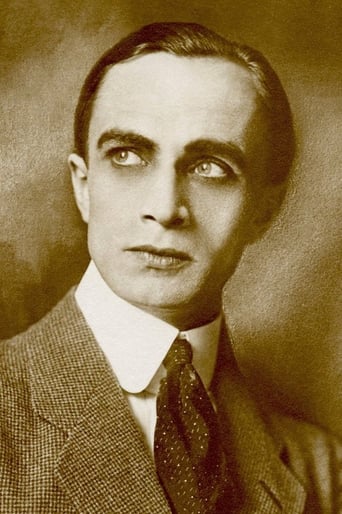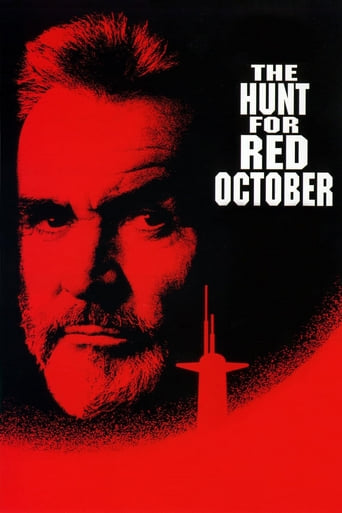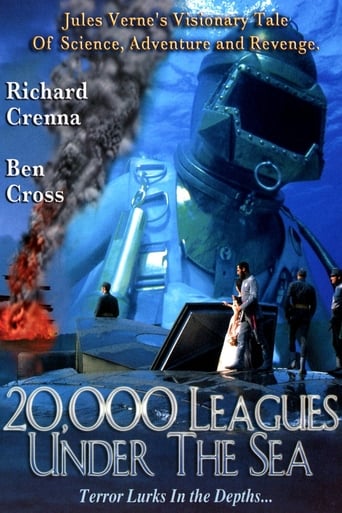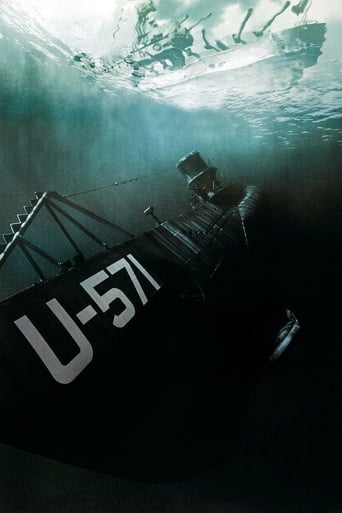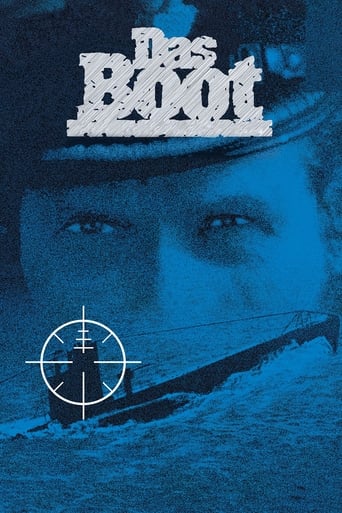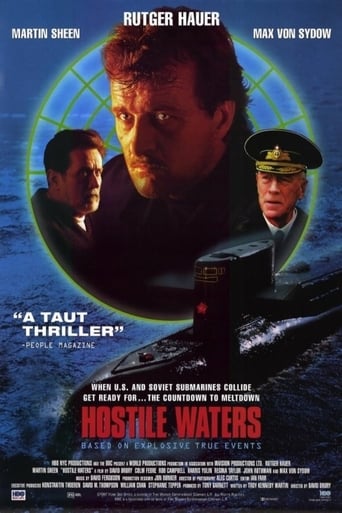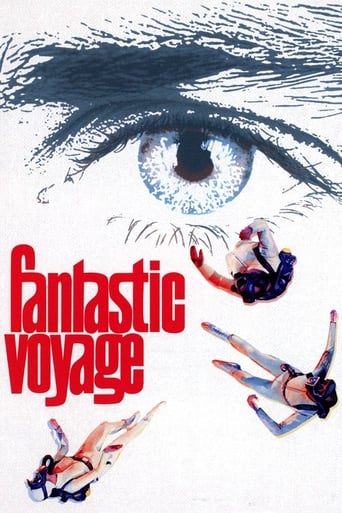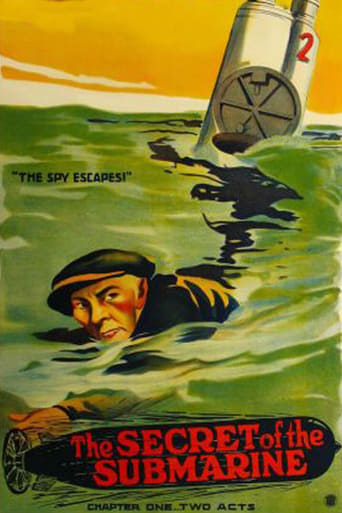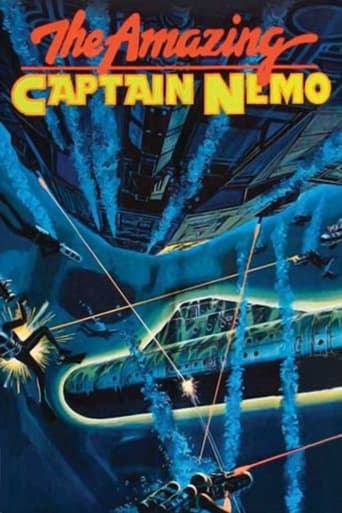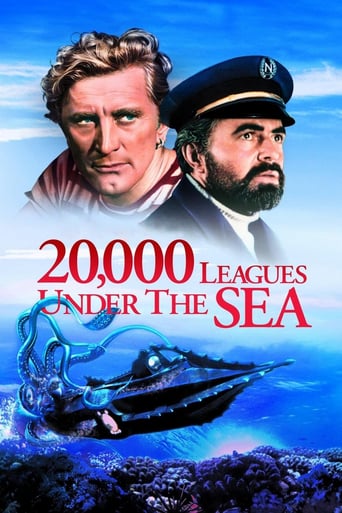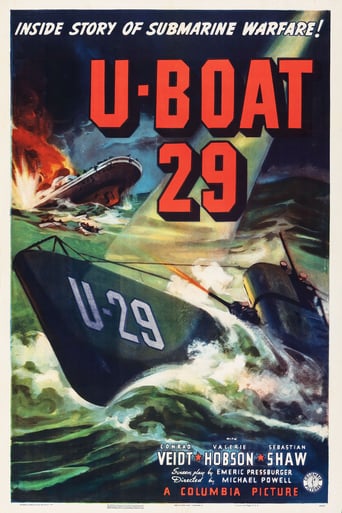
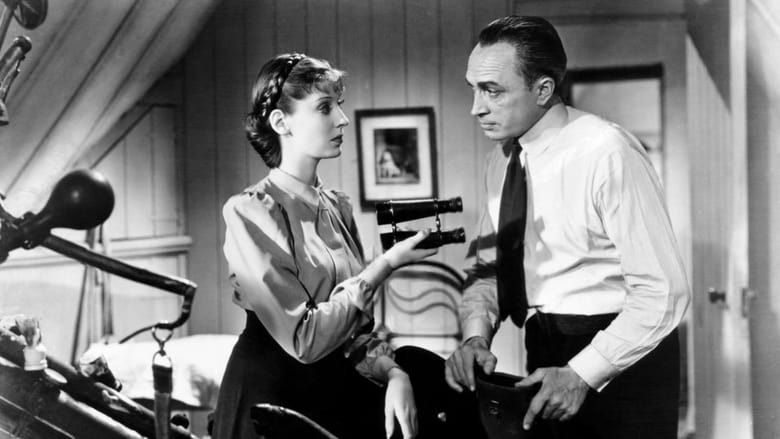
The Spy in Black (1939)
A German submarine is sent to the Orkney Isles in 1917 to sink the British fleet.
Watch Trailer
Cast


Similar titles
Reviews
I could just as easily have summarized this review as Minority Report as it's a certain twelve-to-seven I'll be outnumbered by those lining up to genuflect at ANYTHING bearing the name Michael Powell and if I had a piece of the saliva concession I'd be one happy bunny. I am, of course, equally prone to anticipate new work by favourite directors but also, I hope, sufficiently objective to record when they disappoint; a great admirer of Diane Kurys I was there when L'Anniversaire opened a couple of years back and I really needn't have bothered; Nicole Garcia makes, as a rule, fine movies but Selon Charlie was ho-hum at best; Marion Vernoux made an exquisite film in Rien a faire so I was there on the first day when her latest, A Boire opened: least said ... On the other hand I've never really understood the fuss about Michael Powell, competent, sure, entertaining, on the whole, but DEIFICATION? Gimme a break. It lost me from Frame #1 when having been informed we are in Kiel in the middle of World War I the first thing we see is a newspaper Banner Headline in English which is compounded by people in a hotel, whom it is reasonable to assume are largely German, speaking not only English but using English idiomatic speech. The plot is set in motion when U-boat commander Conrad Veidt is given a mission to infiltrate English security in the Orkneys, a cue for us to cut to that locale. The next sequence is almost beyond parody. A young girl is leaving an inn to take up a post as a schoolteacher on a small island; for the sake of exposition she is obliged to explain this to the landlady who is seeing her off and throw in the additional information that she has obtained both a passport and a Visa. At this juncture an elderly matron turns up in a chauffeur driven car and asks for a room. For no reason other than to move the plot forward she is immediately put in the picture about the schoolteacher which prompts her to offer to drive her to the ferry. En route - and in a time of War and ultra high security - the girl not only reveals that she has a passport but actually PRODUCES it, whereby she is chloroformed by the elderly party so that substitute, in the shape of Valerie Hobson, may take her place. In the fullness of one reel Hobson is installed in the schoolteacher's cottage and has rendez-voused with Veidt; the plan is for a team of U-boats to assemble and sink half the British fleet at Scapa Flow with the help of a disgruntled Royal Navy Officer. Of course what transpires is the equivalent of 'it was all a dream'; the disgruntled Navy type, Sebastian Shaw is really a counter-spy as is Hobson and THEIR plan is to lure as many U-boats as possible into the area then drop a few dozen depth-charges where they will do the most good.It's not ALL bad, of course. Only about two thirds of it.
I first saw this movie on Derby Day 1939 at the then Capitol Cinema in Epsom Surrey UK when I had intended to watch the world famous horse race to be run that day on the nearby Epsom Downs. However, the weather was so wet and windy that I decided to go to a cinema instead. Having just watched the film on television I find that it thrilled me just as much as an octogenarian as it did when I was a teenager in 1939. In my view this is one of the finest of the 1930s British films. The fine quality of the direction and the talent of the principal actors and supporting cast make this a memorable piece of fiction which accurately reflects the narrow attitudes to manners that prevailed in remote parts of Scotland during the time of the first world war.
If one really wants to get a glimmer of what Conrad Veidt's career would have been like in American cinema but for the coming of World War II just as he came to Hollywood, look at his British films from 1934 to 1940. In many respects his best work was done then - he had a wider variety of roles, and was not typecast as villains as frequently as he was in the U.S. Among the films that I'd recommend watching is THE SPY IN BLACK.In World War I, Veidt is the commander of a U.Boat sent to Scottish waters. He is told that there is a British naval officer who is willing to betray the Grand Fleet at Scapa Flow. Veidt is shown interacting with his crew at the beginning, but he goes by life boat to the land, and meets his contact Valerie Hobson. She introduces him to Sebastian Shaw, the naval officer. Shaw seems to be drowning his anger in liquor, but he is prepared to give Veidt a naval document about a sortie by the Grand Fleet on a particular date, which would pass a narrow point the U-Boat would be stationed at. Veidt would then be in a position to sink several of the British dreadnoughts in what would be the worst disaster to strike the fleet since U-Boat Commander Weddigen sank the Hogue, Aboukir, and Cressy in September 1914.It's too good to be true. But gradually Veidt realizes it isn't true. He's been set up, and Shaw and Hobson are trying to capture him. And the film becomes a chase - with Veidt running amongst the islanders in the Hebrides. But his conflict is that of the gentlemanly type. He will use force, if necessary, to still reach his boat and crew and try to do some damage to his enemy's ships. But he is not by nature cruel. A telling moment in the film is late in it, when he commandeers a ferry boat. He is armed and he tells the adults that he won't hesitate to use his gun if necessary. But having said that he hears the crying of a baby that one of the woman on the ferry is carrying, and his voice softens as he says that he certainly will not war against the innocent. Veidt never said anything like that in his Hollywood films - few Nazis (as he himself would have been the first to point out from private knowledge) would have hesitated in hurting an enemy's child or baby.The film was the best that Veidt made playing an enemy officer in either world war. It ends tragically, but honorably for the man, as he decides to join his crew for the last time.
Just wanted to second the other user's comment.I saw this last night as part of a Michael Powell/Emeric Pressberger retrospective underway at the American Cinemetheque. There are some unlikely aspects to the plot, but on the whole this is well crafted WWI thriller with a remarkable level of moral complexity, especially given that it was made and released just as England was entering a second war against Germany.The protagonist (hero?) (played by the extraordinary Conrad Veidt) is a German officer on a spy mission and he is, in many respects, a quite admirable character. For the first half of the film, it's almost entirely from his point of view. It's hard to imagine Hollywood filmmakers EVER having the confidence that Powell and Pressberger clearly had in the intelligence of their audience, allowing them to actually like and admire an enemy agent.While "The Spy in Black" eventually does come down squarely on the side of the English, the agents of the Kaiser come off only as perhaps a hair more ruthless than those fighting for king and country.Of course, the Germany that England would be fighting within a few a few months would be far, far worse. This film is a potent reminder that while World War II might have a morally clear "good" war because of the vast evil of the Nazis, World War I was a horse of a far grayer color.With sophisticated, occasionally black humor, this is a neat bit of old-fashioned movie entertainment with some genuinely intriguing differences. Enthusaistically recommended.


